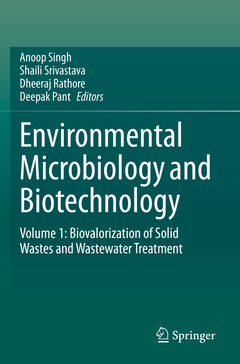Environmental Microbiology and Biotechnology, 1st ed. 2020 Volume 1: Biovalorization of Solid Wastes and Wastewater Treatment

This book provides up-to-date information on the state of the art in applications of biotechnological and microbiological tools for protecting the environment. Written by leading international experts, it discusses potential applications of biotechnological and microbiological techniques in solid waste management, wastewater treatment, agriculture, energy and environmental health.
This first volume of the book ?Environmental Microbiology and Biotechnology,? covers three main topics: Solid waste management, Agriculture utilization and Water treatment technology, exploring the latest developments from around the globe regarding applications of biotechnology and microbiology for converting wastes into valuable products and at the same time reducing the environmental pollution resulting from disposal. Wherever possible it also includes real-world examples. Further, it offers advice on which procedures should be followed to achieve satisfactory results, and provides insights that will promote the transition to the sustainable utilization of various waste products.
Anoop Singh has a PhD in Botany (2004). He is a Scientist at Department of Scientific and Industrial Research (DSIR), Ministry of Science and Technology, Government of India. Before joining DSIR, he worked at Technical University of Denmark, Denmark; University College Cork, Ireland; The Energy and Resources Institute (TERI), New Delhi, India; Indian Agricultural Research Institute (IARI), New Delhi, India; Banaras Hindu University, Varanasi, India and VBS Purvanchal University, Jaunpur, India. He has visited several European countries and participated in several international conferences. He has published more than 50 research articles in scientific journals (h-index 27, citation 7187) and also published three edited books with Springer and CRC Press. He is a member of several scientific communities and serving as Editorial board member for a number of journals besides being a reviewer. His research interests are focused on sustainable agriculture, wastemanagement through agriculture, the utilization of industrial, agricultural and household waste for eco-friendly energy production, renewable energy and their life cycle assessment (LCA).
Shaili Srivastava is an Associate Professor in the Amity School of Earth and Environmental Sciences, Amity University Haryana. Dr Srivastava has done masters and Ph.D. from G.B. Pant University of Agriculture and Technology with specialization in Microbiology and Biotechnology. Before joining Amity, she worked as a lecturer in college and a postdoctoral fellow in Jawaharlal Nehru University, New Delhi. Her research focuses on waste water treatment, degradation of PAH, remediation of heavy metal, microbial sequestration of CO2, biofuel and biosurfactant production, genomics and proteomics involve in CO2 sequestration and value added product formed by microorganisms. She had visited Murdoch University, Perth, Australia, as a visiting research fellow and attended various international conferences as a speak
Date de parution : 09-2021
Ouvrage de 371 p.
15.5x23.5 cm
Date de parution : 09-2020
Ouvrage de 371 p.
15.5x23.5 cm



